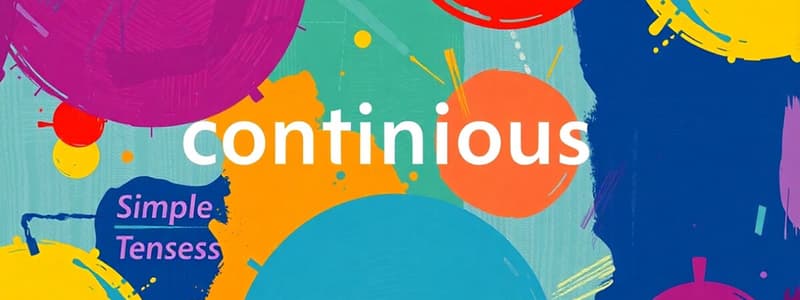Podcast
Questions and Answers
Which sentence correctly uses the simple present tense?
Which sentence correctly uses the simple present tense?
- I eat dinner every evening. (correct)
- I will eat dinner later tonight.
- I ate dinner an hour ago.
- I am usually eating dinner at 7 PM.
Which sentence uses the past continuous tense correctly to describe an action in progress at a specific time in the past?
Which sentence uses the past continuous tense correctly to describe an action in progress at a specific time in the past?
- I was eating when the phone rang yesterday. (correct)
- I eat breakfast every morning.
- I will be eating dinner at 8 PM tonight.
- I am eating dinner right now.
Which sentence accurately uses the future continuous tense?
Which sentence accurately uses the future continuous tense?
- I will eat lunch tomorrow.
- I will be eating lunch at noon tomorrow. (correct)
- I ate lunch yesterday.
- I am eating lunch right now.
Which of the following sentences best exemplifies the use of the simple past tense?
Which of the following sentences best exemplifies the use of the simple past tense?
Which tense is most appropriate for describing an action that is currently happening?
Which tense is most appropriate for describing an action that is currently happening?
Which tense is most appropriate for describing an action that began in the past, continues into the present, and emphasizes the duration?
Which tense is most appropriate for describing an action that began in the past, continues into the present, and emphasizes the duration?
Which tense should you use to describe an action that will be finished before a specific moment in the future?
Which tense should you use to describe an action that will be finished before a specific moment in the future?
Which of the following sentences uses the past perfect tense correctly?
Which of the following sentences uses the past perfect tense correctly?
Which sentence correctly uses the future perfect continuous tense?
Which sentence correctly uses the future perfect continuous tense?
Which tense is appropriate for describing an action in progress at a specific time in the past?
Which tense is appropriate for describing an action in progress at a specific time in the past?
Which tense should be used to describe a general truth or a fact?
Which tense should be used to describe a general truth or a fact?
Which of the following sentences uses the present perfect tense correctly to describe a life experience?
Which of the following sentences uses the present perfect tense correctly to describe a life experience?
Which tense is appropriate for describing an action that had been in progress before another action in the past, emphasizing the duration of the first action?
Which tense is appropriate for describing an action that had been in progress before another action in the past, emphasizing the duration of the first action?
Flashcards
What are Tenses?
What are Tenses?
Indicates when an action or event takes place.
Simple Present Tense
Simple Present Tense
Describes habits, general truths, and permanent situations.
Simple Past Tense
Simple Past Tense
Describes completed actions in the past.
Simple Future Tense
Simple Future Tense
Signup and view all the flashcards
Present Continuous Tense
Present Continuous Tense
Signup and view all the flashcards
Present Perfect Tense
Present Perfect Tense
Signup and view all the flashcards
Past Perfect Tense
Past Perfect Tense
Signup and view all the flashcards
Future Perfect Tense
Future Perfect Tense
Signup and view all the flashcards
Present Perfect Continuous
Present Perfect Continuous
Signup and view all the flashcards
Past Perfect Continuous
Past Perfect Continuous
Signup and view all the flashcards
Future Perfect Continuous
Future Perfect Continuous
Signup and view all the flashcards
Present Simple Usage
Present Simple Usage
Signup and view all the flashcards
Future Simple Usage
Future Simple Usage
Signup and view all the flashcards
Study Notes
- Tenses indicate when an action or event takes place.
- English has past, present, and future tenses.
- Each tense has simple, continuous, perfect, and perfect continuous aspects.
Simple Tenses
- Simple tenses describe actions without specifying completion.
- Simple present describes habits, general truths, and permanent situations.
- Example: "I eat breakfast every morning."
- Simple past describes completed actions in the past.
- Example: "I ate breakfast this morning."
- Simple future describes future actions.
- Example: "I will eat breakfast tomorrow morning."
- Simple present describes habits, general truths, and permanent situations.
Continuous Tenses
- Continuous tenses (progressive tenses) describe actions in progress.
- Present continuous describes actions happening now or around now.
- Structure: am/is/are + present participle (-ing form of verb)
- Example: "I am eating breakfast right now."
- Past continuous describes actions in progress at a specific past time.
- Structure: was/were + present participle
- Example: "I was eating breakfast when you called."
- Future continuous describes actions in progress at a specific future time.
- Structure: will be + present participle
- Example: "I will be eating breakfast at 8 a.m. tomorrow."
- Present continuous describes actions happening now or around now.
Perfect Tenses
- Perfect tenses describe completed actions with relevance to a specific time.
- Present perfect describes actions from the past relevant to the present, or actions completed at an unspecified time in the past.
- Structure: have/has + past participle
- Example: "I have eaten breakfast already."
- Past perfect describes actions completed before a specific time in the past.
- Structure: had + past participle
- Example: "I had eaten breakfast before I went to work."
- Future perfect describes actions to be completed before a specific time in the future.
- Structure: will have + past participle
- Example: "I will have eaten breakfast by the time you arrive."
- Present perfect describes actions from the past relevant to the present, or actions completed at an unspecified time in the past.
Perfect Continuous Tenses
- Perfect continuous tenses describe actions that began in the past, continued until recently, and may still be ongoing.
- Present perfect continuous describes actions that started in the past and are still continuing or have only just stopped.
- Structure: have/has been + present participle
- Example: "I have been eating breakfast for an hour."
- Past perfect continuous describes actions in progress before a specific time in the past.
- Structure: had been + present participle
- Example: "I had been eating breakfast for an hour before you called."
- Future perfect continuous describes actions in progress for a period before a specific future time.
- Structure: will have been + present participle
- Example: "I will have been eating breakfast for an hour by the time you arrive."
- Present perfect continuous describes actions that started in the past and are still continuing or have only just stopped.
Tense Usage Summary
- Present Simple: habitual actions, facts, general truths, scheduled events in the near future
- Present Continuous: actions happening now, temporary situations, future arrangements
- Present Perfect: actions that started in the past and continue to the present, life experiences, recent actions with present relevance
- Present Perfect Continuous: actions that started in the past and continue to the present, emphasizing duration
- Past Simple: completed actions in the past, series of completed actions
- Past Continuous: actions in progress at a specific time in the past, background actions
- Past Perfect: actions completed before a specific time in the past
- Past Perfect Continuous: actions that had been in progress before a specific time in the past, emphasizing duration
- Future Simple: predictions, spontaneous decisions, promises
- Future Continuous: actions that will be in progress at a specific time in the future
- Future Perfect: actions that will be completed before a specific time in the future
- Future Perfect Continuous: actions that will have been in progress for a period of time before a specific time in the future, emphasizing duration
Studying That Suits You
Use AI to generate personalized quizzes and flashcards to suit your learning preferences.




